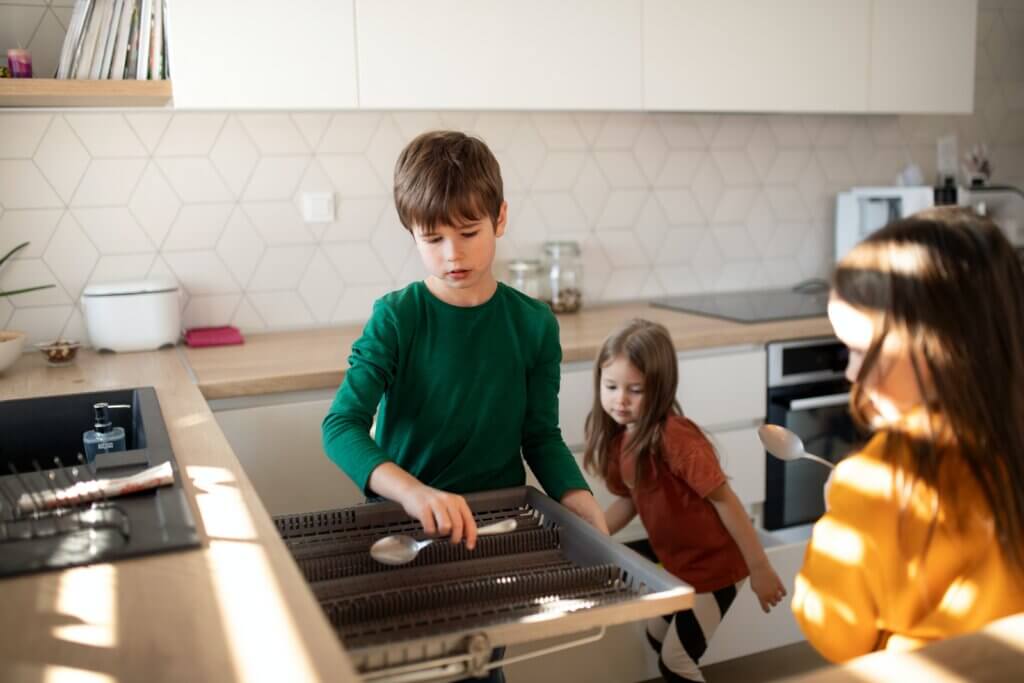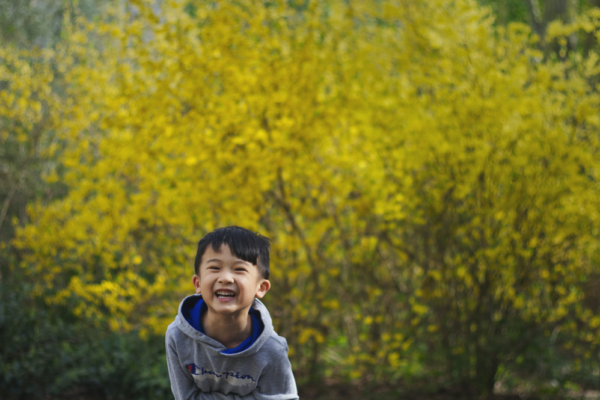Three Time-Tested Positive Discipline Tools for Nannies
One of my all-time favorite Positive Discipline books is “Positive Discipline Parenting Tools” which Dr. Jane Nelsen wrote with two of her adult children, Mary Tamborski & Brad Ainge. This book breaks down each of the 49 unique tools that we use in Positive Discipline with stories & examples. While this book is written with parents in mind, the content and all of the tools are relevant and applicable to nannies & other caregivers too.
Chapter 1 is called “The Basics,” and it includes some foundational Positive Discipline strategies. Here are some of my own thoughts, stories, & experiences from nannying, relating to a few of these basic “Positive Discipline Parenting Tools.”
Take Time for Training
Take time for training is simply the idea that you must explain a task, practice together, and then supervise while the child does it before you can expect them to perform the task on their own. Makes sense to me! If you tell a child to make their bed without ever teaching them how someone makes a bed, they’re not going to nail it, and that can become frustrating for everyone involved. Same with cleaning their room, doing the dishes, doing their laundry – all of those life skills! It’s a lot like teaching division – you wouldn’t tell a kid who is brand new to the idea to, “Just do it! Divide!” You have to teach it step-by-step, practice it together, check for understanding, let them practice some more, & in a few months you might even have to take a step back and re-teach it. Chores and practical life skills are learned the same way!
Taking time for training has been a game changer for me & my nanny kids. I first wrote about this a few years ago, mid-pandemic:

“I wanted to start small, so I decided to focus specifically on getting toys cleaned up & put away in the right spot this week. Looking back, I can’t really figure out why I wasn’t expecting them to help me clean up the playroom & toys everyday, but I was pretty resigned that that fell to me. I told my nanny kiddos on Monday that they are going to start helping me clean up the toys & playroom and was surprised that I didn’t get any resistance! I had it in my head that they didn’t want to help clean, but that wasn’t the case at all. I really took time for training, starting earlier than we’d usually clean up because I knew it would take a while, and I explained each step. I narrated what I was doing, and I asked for help, being specific about what I needed them to do. I checked for understanding & made sure they understand where their items go. Every day, they did a better job & showed me they were completely capable of this (duh, Danielle!). Not only were they on board, but I could see how empowered they were doing this themselves! We also got to enjoy the feeling of working as a team. These kiddos have exceeded my expectations (as they always do). Take time for training seems so simple, and I just hadn’t given it the attention & focus that it deserved before.”
This resonated with me when I was in the same playroom yesterday, with the same nanny kids, about two and a half years later, and I remembered that pivotal week. I realized how adept they are at getting their toys cleaned up now! It’s not spotless all of the time, but I’m very glad that I handed that job over to them. I’m happy to give reminders, jump in and assist, and ask for help when I need it, but those kiddos know their messes are their jobs to take care of.
I think as nannies, since we’re “on the clock,” we can easily fall into thinking that child-related chores fall to us, but they don’t! By doing these jobs for kids, we’re robbing them of the chance to learn important life skills (which, by the way, boost self-esteem)! Also, parents LOVE it when their kids can help around the house.
When you focus on training, Jane Nelsen reminds us not to expect perfection or pull in rewards – just keep teaching & practicing.
Kind & Firm
I love the idea of simultaneously being kind and firm. This is really the crux of Positive Discipline, and it’s what keeps us from being too permissive. I’ve ended up incorporating being kind & firm into many aspects of my life outside of nannying and now frequently use that as a descriptor of myself. All of the other Positive Discipline tools rely on you being able to balance being kind & firm at the same time.
For me, being kind & firm is best practiced with the power of and. Validating their feelings & experience while holding your boundaries at the same time, which might sound like:
“I can tell you’re having fun playing, and now it’s time for lunch.”
“You’re showing me you’re very angry, and I won’t let you hurt my body.”
“Oh shoot, I see you’re in the middle of your show, and your screen time is up now.”
The other important thing about this tool is that being kind doesn’t just mean you’re super nice, it means you are connected and respectful to the child you’re caring for (just as firm doesn’t mean that you’re mean)! Remember that it’s not our job as nannies to be super duper nice and to keep kids happy all day. Of course we want to be warm and caring, but remember that it’s okay for kids to be disappointed, frustrated, and upset. Those feelings build resiliency.
Being kind and firm at the same time is how we can make sure that you as the adult, the child(ren) in your care, and the environment you’re in are all being treated respectfully.
Winning Cooperation
Winning cooperation is the idea that children feel encouraged when we understand and listen to their point of view. By showing empathy and focusing on solutions together, children will become more cooperative because they feel significance and belonging.
But why should we have to win kids’ cooperation? Shouldn’t kids just do what we say? Not necessarily! We don’t want to raise pushover, passive, blindly-obedient kids. We want to raise thoughtful people who know what’s right and wrong for them. My goal isn’t for my nanny kids to passively do what I say all day, every day. Instead, I focus on winning cooperation & being in relationship with the kiddos I care for. Their thoughts & feelings are all as valid as mine are, and my nanny kiddos often bring up reasonable counterpoints or different thoughts that can change my perspective on the matter. I’m flexible and open-minded to what they share. While I am the adult in charge, I’m not a dictator!
L. R. Knost, one of my favorite authors, writes: “Instant obedience and mindless compliance are poor goals, indeed, when raising children. A thoughtfully questioning, passionately curious, and humorously resourceful child who delights in inventing ‘compromises’ and who endlessly pushes the boundaries tends to become a thoughtful, passionate, resourceful adult who will change the world rather than being changed by the world.”
In 2020 I focused on winning cooperation for one week- just one week! The result was profound, as I wrote at the time:
“I really kept this at the forefront this week and tried to win cooperation. I did have good luck connecting with my NK5 telling him stories about times I’ve had similar feelings or behaviors. We really connected over trying new foods or disliking foods, and he thought it was neat there were some foods he does like that I don’t care for. I also tried to make sure I wasn’t getting in power struggles or trying to “win,” and I let a few things go that I usually wouldn’t (and everything turned out fine, if not better). The biggest thing that stuck out to me this week was how truly cooperative children are when they’re feeling connected with you. It’s such a night and day difference and makes the day so much smoother and easier. Taking the time to connect before undesirable behavior pops up sets us all up for success. I’m also really appreciating what interesting, funny little people I take care of.”
Winning cooperation is really on you, as the adult, to be the bigger person and to stay in control when you’re frustrated.
Sure, I am stronger, louder, and have a better vocabulary than my nanny kids – I could definitely use threats, yelling, or force to make kids do something, but that leaves everyone feeling awful. Winning cooperation, on the other hand, makes me feel like a more confident, competent nanny because we still get everything done, I’m not in constant power struggles, and everyone feels respected and heard. Winning cooperation keeps us on the same team, which is good for our relationship & models positive traits that I want to teach.
Dr. Jane Nelsen writes so beautifully about winning cooperation in the “Positive Discipline Parenting Tools” book, explaining that “one of the best ways to win children over is to do things with them instead of to or for them. Doing things with them means respectfully involving them in finding solutions that work for everyone.” That really sums it up, doesn’t it?
Those are just three tools of Positive Discipline, but they have all made huge impacts on my day-to-day work. Taking time for training, balancing kindness & firmness, and winning cooperation makes me a better, happier nanny. These tools do take intention and practice, AND they’re well worth the effort!





Comments